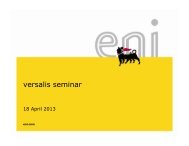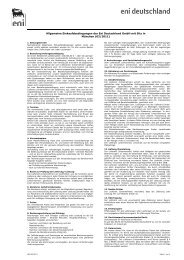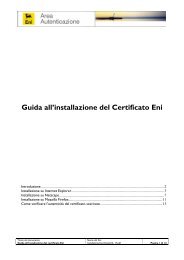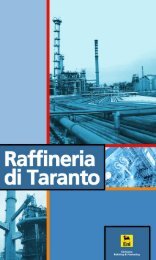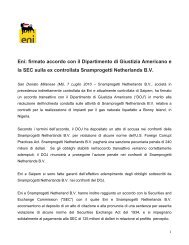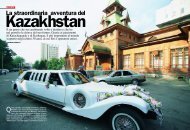È in corso il restauro conservativo del Duomo di Milano. Un ... - Eni
È in corso il restauro conservativo del Duomo di Milano. Un ... - Eni
È in corso il restauro conservativo del Duomo di Milano. Un ... - Eni
You also want an ePaper? Increase the reach of your titles
YUMPU automatically turns print PDFs into web optimized ePapers that Google loves.
REPORTAGE<br />
appena superiore a 10 m<strong>il</strong>ioni <strong>di</strong> abitanti, l’amm<strong>in</strong>istrazione<br />
pubblica esprime nei numeri e nella concretezza <strong>del</strong>la quota<br />
<strong>di</strong> economia nazionale che essi assorbono la r<strong>il</strong>evanza imposta<br />
ancora oggi alle forme <strong>del</strong>la modernizzazione dallo stato<br />
da un costume protezionistico (<strong>il</strong> b<strong>il</strong>ancio <strong>del</strong> Portogallo deve<br />
scontare nei salari <strong>del</strong>la pubblica amm<strong>in</strong>istrazione una<br />
spesa che supera <strong>del</strong> 50% la me<strong>di</strong>a <strong>del</strong>l’Ue).<br />
Questo pesante legato tuttavia non significa che <strong>il</strong> vecchio<br />
Portogallo sia un vecchio paese. I cambiamenti sono stati<br />
profon<strong>di</strong>, portati comunque dalla rottura che i capitani d’apr<strong>il</strong>e<br />
hanno imposto a una <strong>in</strong>sostenib<strong>il</strong>e cont<strong>in</strong>uità <strong>del</strong>la storia<br />
nazionale, ma portati anche dall’<strong>in</strong>gresso <strong>di</strong> Lisbona nell’<strong>Un</strong>ione<br />
Europea, nel 1986. Se <strong>in</strong> quel Portogallo vecchio<br />
che “a Revolucao” frantumò c’era ancora un portoghese su<br />
tre che doveva <strong>il</strong>lum<strong>in</strong>are casa propria con le can<strong>del</strong>e e con<br />
<strong>il</strong> lume a petrolio; se ancora soltanto la metà dei portoghesi<br />
aveva <strong>in</strong> quel tempo l’acqua corrente <strong>in</strong> casa; se <strong>il</strong> 25% <strong>di</strong> loro<br />
non sapeva ancora leggere né scrivere e se l’<strong>Un</strong>iversità<br />
aveva soltanto 38 m<strong>il</strong>a studenti, oggi <strong>in</strong>vece <strong>il</strong> Portogallo è<br />
uno dei tanti paesi <strong>del</strong>l’Ue.<br />
Tutte le case hanno luce elettrica e acqua, l’analfabetismo è<br />
caduto al 9%, <strong>il</strong> numero dei suoi studenti che frequentano<br />
l’università (390 m<strong>il</strong>a) vale <strong>di</strong>eci volte <strong>il</strong> registro <strong>di</strong> quel tempo<br />
f<strong>in</strong>ito, le donne – cui molte professioni erano vietate –<br />
rappresentano la maggioranza dei laureati e la metà <strong>del</strong>la<br />
forza lavoro, <strong>il</strong> consumo me<strong>di</strong>o <strong>del</strong>le calorie ha guadagnato<br />
un <strong>in</strong>cremento <strong>del</strong> 22%, l’aspettativa <strong>di</strong> vita è aumentata <strong>di</strong><br />
10 anni. E <strong>il</strong> red<strong>di</strong>to <strong>in</strong><strong>di</strong>viduale, che <strong>in</strong> quel tempo era <strong>di</strong> poco<br />
superiore all’equivalenza <strong>di</strong> 100 euro, oggi ha raggiunto<br />
gli 8.000 euro.<br />
Sono risultati impressionanti: cifre e numeri che <strong>di</strong>segnano<br />
una società ormai omologata ai paesi più avanzati <strong>del</strong>l’Europa<br />
anche se i conti <strong>del</strong> passato pesano tuttora, e pesano molto.<br />
Il sociologo Antonio Barreto lo <strong>di</strong>ce <strong>in</strong> una s<strong>in</strong>tesi veloce:<br />
“La storia con<strong>di</strong>ziona <strong>di</strong> fatto le nostre prospettive: a <strong>di</strong>fferenza<br />
<strong>del</strong>la Spagna, che pure viveva sotto una <strong>di</strong>ttatura, <strong>il</strong> regime<br />
salazariano era ideologicamente chiuso a ogni forma <strong>di</strong><br />
sv<strong>il</strong>uppo. Abbiamo anche combattuto una guerra coloniale<br />
<strong>di</strong> 15 anni, abbiamo avuto una rivoluzione che <strong>in</strong> pratica nazionalizzò<br />
l’<strong>in</strong>tera economia, e poi abbiamo anche subito una<br />
controrivoluzione. Sono traumi sociali e politici profon<strong>di</strong>,<br />
sconvolgimenti che lasciano <strong>il</strong> segno; tirarsi fuori da quella<br />
drammatica ere<strong>di</strong>tà è stato un compito nient’affatto fac<strong>il</strong>e”.<br />
Il secondo Portogallo è proprio questo, dei professionisti,<br />
degli <strong>in</strong>tellettuali, dei politici, che riconoscono la qualità alta,<br />
perf<strong>in</strong>o stupefacente, dei miglioramenti conseguiti dal paese<br />
e però sono consapevoli che tutto ciò non è sufficiente <strong>di</strong><br />
fronte alle sfide che la d<strong>in</strong>amica accelerata dei mercati <strong>in</strong>ternazionali<br />
detta alle economie nazionali. Il p<strong>il</strong> <strong>del</strong> Portogallo è<br />
appena <strong>il</strong> 2% <strong>del</strong>la ricchezza prodotta dall’<strong>in</strong>tera <strong>Un</strong>ione europea,<br />
ma quella quota pur modesta garantiva comunque<br />
una presenza significativa su alcuni mercati cont<strong>in</strong>entali; oggi,<br />
con l’allargamento <strong>del</strong>l’<strong>Un</strong>ione a 25 stati-membri, anche<br />
le certezze più consolidate e i rapporti più garantiti appaiono<br />
rimessi <strong>in</strong> <strong>di</strong>scussione.<br />
Più <strong>del</strong>l’80% <strong>del</strong>le esportazioni portoghesi sono tra<strong>di</strong>zionalmente<br />
<strong>di</strong>rette verso i mercati degli altri 14 paesi <strong>del</strong>la<br />
“vecchia” Ue e comunque i due terzi hanno per dest<strong>in</strong>azione<br />
consumatori e acquirenti <strong>del</strong>la zona <strong>del</strong>l’euro. Dunque <strong>il</strong><br />
trend <strong>di</strong> sv<strong>il</strong>uppo <strong>del</strong>l’economia europea ha un’<strong>in</strong>cidenza<br />
<strong>di</strong>retta sull’economia portoghese. E f<strong>in</strong> che l’Ue ha offerto<br />
34<br />
tassi <strong>di</strong> sv<strong>il</strong>uppo significativi, anche Lisbona ha potuto godere<br />
<strong>di</strong> riscontri <strong>in</strong>coraggianti (tra <strong>il</strong> 1995 e <strong>il</strong> 2000 la domanda<br />
esterna è cresciuta me<strong>di</strong>amente <strong>del</strong> 9% l’anno).<br />
Quando però l’economia europea è entrata <strong>in</strong> una fase <strong>di</strong><br />
stanca, o ad<strong>di</strong>rittura <strong>di</strong> recessione, la ricaduta sul Portogallo<br />
è stata drammatica: <strong>il</strong> tasso <strong>di</strong> crescita <strong>del</strong> 2001 si è fermato<br />
appena all’1,4% e soltanto allo 0,8 negli anni successivi.<br />
La conseguenza si è manifestata imme<strong>di</strong>atamente nella<br />
vita quoti<strong>di</strong>ana <strong>del</strong>la società: <strong>il</strong> red<strong>di</strong>to pro-capite che al<br />
tempo <strong>del</strong>la “Revolucao” non arrivava nemmeno al 55%<br />
<strong>del</strong>la me<strong>di</strong>a <strong>del</strong>l’Ue – e che però nel 2002, con <strong>il</strong> balzo pro<strong>di</strong>gioso<br />
<strong>di</strong> tutti quegli anni, aveva già toccato <strong>il</strong> 71% <strong>di</strong> quella<br />
me<strong>di</strong>a – ora è sceso al 68,8%, con un’<strong>in</strong>versione drammatica<br />
<strong>di</strong> tendenza.<br />
<strong>Un</strong> duro programma <strong>di</strong> austerità e <strong>di</strong> riforme – anche per riportare<br />
l’economia all’<strong>in</strong>terno dei parametri <strong>di</strong> Maastricht –<br />
ha avuto <strong>il</strong> riscontro <strong>di</strong> risultati <strong>in</strong>coraggianti da un punto <strong>di</strong><br />
vista <strong>di</strong> analisi macroeconomica (e <strong>il</strong> governo conta comunque<br />
<strong>di</strong> recuperare presto <strong>in</strong><strong>di</strong>ci molto positivi), tuttavia <strong>il</strong> costo<br />
sociale non è stato affatto <strong>in</strong>dolore.<br />
A leggere tutti questi numeri per ciò che essi davvero<br />
<strong>Eni</strong>’s Way<br />
economy <strong>in</strong> a budget destroyed by useless colonial wars, and<br />
the bureaucratic structure – rather than slimm<strong>in</strong>g down,<br />
accept<strong>in</strong>g the forms of change that were destab<strong>il</strong>iz<strong>in</strong>g the old<br />
society and its <strong>il</strong>lusions – became one of the structures of the<br />
“Revolucao”. The renewal became lateness, profound<br />
contra<strong>di</strong>ction, even conservative survival. The result is that the<br />
old culture, rooted <strong>in</strong> the empire and <strong>in</strong> the “estado novo”, the<br />
culture of <strong>in</strong>stitutional paternalism, of the bureaucratic<br />
management of social relations, floats along, <strong>in</strong><strong>di</strong>fferent to the<br />
new times and new challenges.<br />
With more than 700 thousand civ<strong>il</strong> servants out of a population<br />
of barely more than 10 m<strong>il</strong>lion, the public adm<strong>in</strong>istration<br />
expresses, <strong>in</strong> the numbers and soli<strong>di</strong>ty of its share of the<br />
national economy that they absorb, the relevance imposed<br />
today on the forms of modernisation of the state by a<br />
protectionist approach (the Portuguese budget needs to set<br />
aside for public employee salaries an amount that is 50 pct<br />
above the EU average).<br />
This heavy legacy nevertheless does not mean that old Portugal<br />
is an old country. Changes have been deep, brought about by<br />
the Apr<strong>il</strong> officers break with an unsusta<strong>in</strong>able cont<strong>in</strong>uity of<br />
<strong>Eni</strong>’s Way<br />
PRESENZA ENI. La società è presente<br />
nel mercato <strong>del</strong> gas naturale<br />
attraverso la società Galp Energia.<br />
Nel 2004 sono stati venduti nel Paese<br />
4,4 m<strong>il</strong>iar<strong>di</strong> <strong>di</strong> metri cubi <strong>di</strong> gas<br />
naturale a circa 820 m<strong>il</strong>a clienti<br />
ut<strong>il</strong>izzando una rete <strong>di</strong> gasdotti<br />
<strong>di</strong> circa 11.700 ch<strong>il</strong>ometri.<br />
Per accedere al mercato spagnolo<br />
<strong>del</strong> gas <strong>Eni</strong> ha previsto <strong>in</strong>oltre<br />
la partecipazione <strong>in</strong> due <strong>in</strong>frastrutture<br />
<strong>di</strong> importazione: <strong>il</strong> gasdotto<br />
Transmaghreb<strong>in</strong>o e <strong>il</strong> term<strong>in</strong>ale GNL<br />
<strong>di</strong> S<strong>in</strong>es. Nel settore<br />
<strong>del</strong>la <strong>di</strong>stribuzione <strong>del</strong> gas la Società<br />
è presente anche attraverso quote<br />
m<strong>in</strong>oritarie <strong>di</strong> partecipazione<br />
nella Setgas e Lusitaniagas.<br />
Nel settore petrolchimico,<br />
attraverso Polimeri Europa, <strong>di</strong>spone<br />
<strong>di</strong> un impianto a Viana do Castelo,<br />
nel Nord <strong>del</strong> Portogallo,<br />
per la produzione <strong>di</strong> ad<strong>di</strong>tivi chimici.<br />
Nella foto a s<strong>in</strong>istra, la spiaggia<br />
<strong>di</strong> Albufeira e, a destra, i mul<strong>in</strong>i<br />
a vento <strong>del</strong>l’isola <strong>di</strong> Faial<br />
nelle Azzorre.<br />
ENI'S PRESENCE. The company<br />
is operat<strong>in</strong>g <strong>in</strong> the country's natural gas<br />
market through Galp Energia. In 2004,<br />
a total of 4.4 b<strong>il</strong>lion cubic metres<br />
of natural gas were sold <strong>in</strong> the country<br />
to about 820,000 customers us<strong>in</strong>g<br />
a 11,700 k<strong>il</strong>ometre gas pipel<strong>in</strong>es<br />
network. To enter Spa<strong>in</strong>’s gas market,<br />
<strong>Eni</strong> has planned its participation<br />
<strong>in</strong> two major import fac<strong>il</strong>ities:<br />
the Trans-Maghreb gas pipel<strong>in</strong>e<br />
and the LNG term<strong>in</strong>al <strong>in</strong> S<strong>in</strong>es.<br />
The company is active also <strong>in</strong> the gas<br />
<strong>di</strong>stribution sector through m<strong>in</strong>ority<br />
stakes <strong>in</strong> Setgas and Lusitaniagas.<br />
Through Polimeri Europa,<br />
<strong>Eni</strong> also owns a petrochemical<br />
plant at Viana do Castelo, <strong>in</strong> northern<br />
Portugal, for the production<br />
of chemical ad<strong>di</strong>tives. Left, the beach<br />
of Albufeira and, right,<br />
w<strong>in</strong>dm<strong>il</strong>ls <strong>in</strong> the island of Faial<br />
<strong>in</strong> the Azores.<br />
national history, but also due to entry <strong>in</strong>to the<br />
European <strong>Un</strong>ion <strong>in</strong> 1986. In that old Portugal crushed<br />
by “a Revolucao” there was st<strong>il</strong>l one Portuguese <strong>in</strong><br />
three who lit their house with candles and with o<strong>il</strong><br />
lamps; st<strong>il</strong>l only half of the Portuguese <strong>in</strong> those days<br />
had runn<strong>in</strong>g water at home; 25 pct of them were st<strong>il</strong>l<br />
<strong>il</strong>literate and there were only 38,000 university<br />
students. Now Portugal is one of many EU member<br />
states.<br />
All houses have electric light and water, <strong>il</strong>literacy has<br />
fallen to 9%, the number of university students<br />
(390,000) is ten times the figure recorded <strong>in</strong> those<br />
days; women – to whom many professions were<br />
banned – represent the majority of graduates and half<br />
the labour force; average calorie consumption has<br />
risen by 22%, life expectancy is up 10 years. And<br />
<strong>in</strong><strong>di</strong>vidual <strong>in</strong>come, which at that time was little more<br />
than the equivalent of 100 euro, today has reached<br />
8,000 euro.<br />
These are impressive results: figures and numbers<br />
that show a society that is sim<strong>il</strong>ar to the most<br />
advanced <strong>in</strong> Europe even if the effects of the past<br />
are st<strong>il</strong>l felt and are felt a lot. The sociologist, Antonio<br />
Barreto, said <strong>in</strong> a brief synthesis: “History has<br />
effectively con<strong>di</strong>tioned our prospects. <strong>Un</strong>like Spa<strong>in</strong>,<br />
which also lived under a <strong>di</strong>ctatorship, the Salazar<br />
regime was ideologically closed to any form of growth. We also<br />
fought a colonial guerr<strong>il</strong>la war for 15 years. We had a revolution<br />
that <strong>in</strong> practice nationalised the entire economy and then we<br />
also were subject to a counter-revolution. They are deep social<br />
and political traumas, <strong>di</strong>fficulties that leave their mark; exit<strong>in</strong>g<br />
from that dramatic heritage was not at all an easy task.”<br />
The second Portugal is actually this, the one of professionals,<br />
of <strong>in</strong>tellectuals, of politicians, who acknowledge the high, even<br />
stupefy<strong>in</strong>g quality of the improvements achieved by the nation<br />
and yet are aware that all this is not enough <strong>in</strong> the face of the<br />
challenges of the accelerated dynamics <strong>in</strong>ternational markets<br />
<strong>di</strong>ctate to national economies. Portugal’s GDP is just 2 pct of<br />
the wealth produced by the entire European <strong>Un</strong>ion, but that<br />
share although modest used to guarantee a significant<br />
presence on some cont<strong>in</strong>ental markets. Today, with the<br />
enlargement of the EU to 25 member states, even the most<br />
established certa<strong>in</strong>ties and most secure relations appear to be<br />
once more called <strong>in</strong>to question.<br />
More than 80 pc of Portugal’s exports tra<strong>di</strong>tionally go to the<br />
markets of the other 14 ‘old’ EU members and two thirds are<br />
for consumers and buyers <strong>in</strong> the eurozone. So the trend of<br />
35



